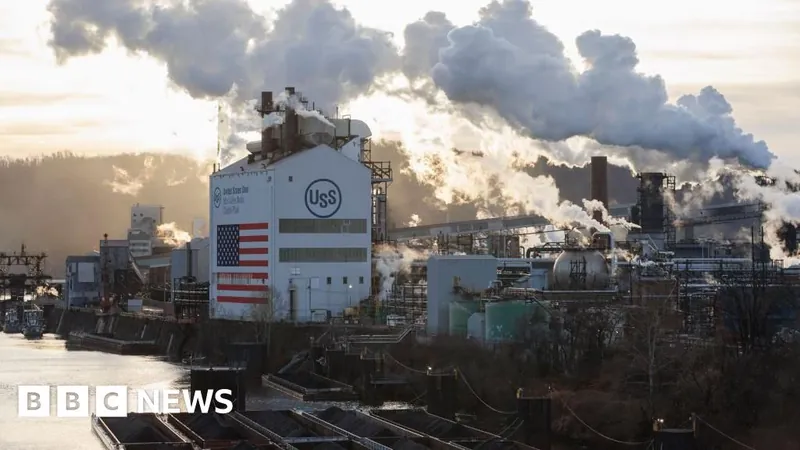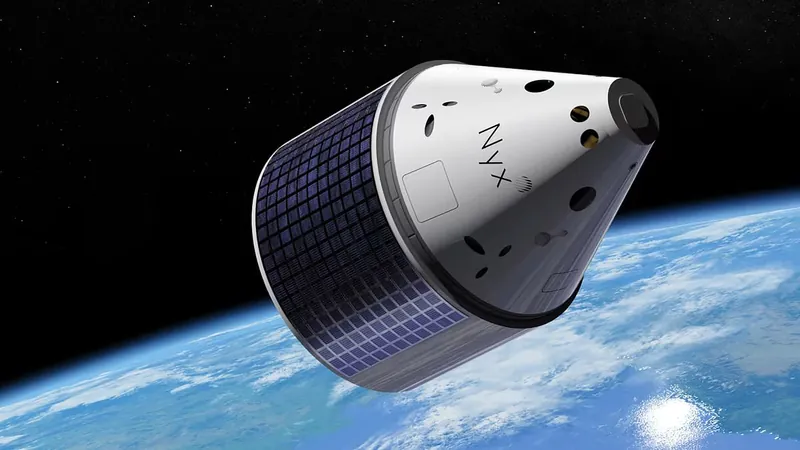
Biden Blocks Japanese Steel Giant from Acquiring US Steel: What This Means for International Relations and American Workers
2025-01-03
Author: Jessica Wong
Introduction
In a bold move that has sent shockwaves through the international business community, US President Joe Biden has decisively blocked the proposed takeover of US Steel by Japan's Nippon Steel. This action not only fulfills a political promise but also underscores the Biden administration's commitment to protecting American industries amid growing competition from foreign firms.
National Security Concerns
Biden's decision is rooted in national security concerns, emphasizing that maintaining US ownership of critical industries, such as steel production, is vital for the strength and resilience of domestic supply chains. The announcement, made shortly before the election season ramped up, aligns with the administration's focus on supporting American workers and industries, particularly in the key swing state of Pennsylvania, where US Steel's operations are located.
Response from U.S. Steel and Nippon Steel
The intervention follows intense lobbying from the United Steelworkers union, which had raised alarms about the potential risks associated with the foreign acquisition during a politically charged environment leading up to the 2024 presidential campaign. Both Nippon Steel and US Steel, taken aback by the decision, have accused the government of politicizing the review process and indicated intentions to pursue legal action if necessary.
Economic Implications
In their response, the companies expressed deep disappointment, declaring that the ruling sends a detrimental message to foreign businesses considering significant investments in the United States. This sentiment was echoed by Japanese officials, including Minister of Economy, Trade, and Industry Yoji Muto, who cautioned that the decision could have long-lasting repercussions for future US-Japan economic relations.
The Deal's Background
The $14.9 billion deal, which had been under negotiation for nearly a year, promised to rejuvenate a storied American company that has seen better days. Once a paragon of American industrial strength, US Steel is now grappling with declining fortunes and the threat of factory closures without the influx of investment that would have come with Nippon Steel's acquisition.
Labor Commitments by Companies
To win favor for their deal, the companies had committed to maintaining employment levels and even proposed funding a workforce training center along with granting the federal government the power to oversee production changes. Despite these efforts, Biden maintained a firm stance against the deal, citing the importance of a strong, domestically owned steel sector for infrastructure, the automotive industry, and national defense.
Political Strategy
Political analysts suggest that the decision reflects a broader strategy by the Biden administration to prioritize American economic interests and protect jobs at home. This is seen as a continuation of policies initiated during the Trump administration, emphasizing an 'America First' approach to foreign investment and trade.
Market Reactions
While the immediate reaction saw shares in US Steel fall by over 5%, experts warn that this ruling might not signify the end of Nippon Steel's aspirations. The Committee on Foreign Investment in the United States has the authority to extend the deadline, leaving the door open for potential renegotiations.
Conclusion
As the dust settles, all eyes will remain on how this decision impacts US-Japan relations and what it signifies for foreign investments in the American market moving forward. The Biden administration is likely to face scrutiny on whether such protective measures will indeed foster a resilient domestic industry or provoke unintended diplomatic tensions with one of its closest allies.
As the confrontation unfolds, the fate of US Steel and its workforce hangs in the balance, spotlighting the intricate dance between national security and global economic interdependence. The question remains: Will foreign investment become a scapegoat in the pursuit of the American job market, or will the administration find a middle ground that preserves both?



 Brasil (PT)
Brasil (PT)
 Canada (EN)
Canada (EN)
 Chile (ES)
Chile (ES)
 Česko (CS)
Česko (CS)
 대한민국 (KO)
대한민국 (KO)
 España (ES)
España (ES)
 France (FR)
France (FR)
 Hong Kong (EN)
Hong Kong (EN)
 Italia (IT)
Italia (IT)
 日本 (JA)
日本 (JA)
 Magyarország (HU)
Magyarország (HU)
 Norge (NO)
Norge (NO)
 Polska (PL)
Polska (PL)
 Schweiz (DE)
Schweiz (DE)
 Singapore (EN)
Singapore (EN)
 Sverige (SV)
Sverige (SV)
 Suomi (FI)
Suomi (FI)
 Türkiye (TR)
Türkiye (TR)
 الإمارات العربية المتحدة (AR)
الإمارات العربية المتحدة (AR)